The Perseverance Rover has found something very unusual on the surface of Mars. Instead of finding past microbial life forms as part of its mission, the Mars Rover has found a piece of “human trash” on its surface.
All our space exploration initiatives to Mars, be it the Perseverance Mars Roveror the Mangalyaan Mars Orbiterhave been desperately looking for some form of microbial life on the planet.
Well, they did find something bewildering, but not life. Instead, NASA’s Perseverance Mars Rover has found human trash on the red planet. While carrying out one of its regular scheduled inspections of Mars’ surface, NASA’s Perseverance rover recently spotted landing debris caught in a jagged rock. The piece of trash that the rover found was a thermal material that the American space agency used to protect the Perseverance spacecraft from extreme temperatures as it journeyed to Mars and plummeted through the Martian atmosphere.
In a tweet, the team of NASA engineers handling the Perseverance said, “My team has spotted something unexpected: It’s a piece of a thermal blanket that they think may have come from my descent stage, the rocket-powered jet pack that set me down on landing day back in 2021.”
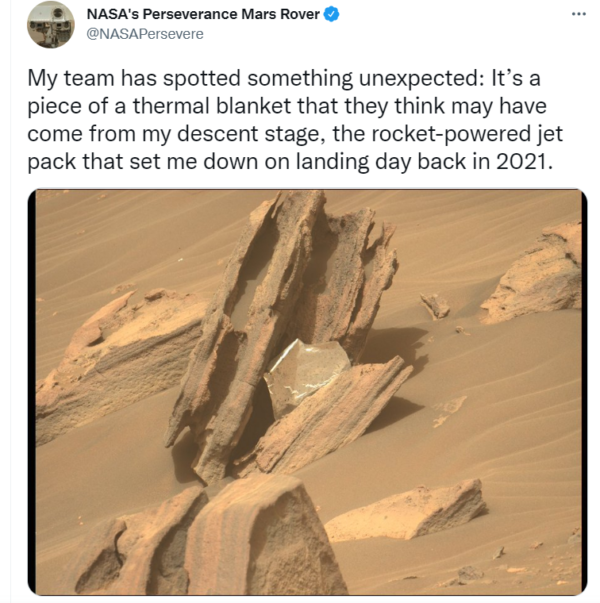
An extremely pertinent question that this piece of foil poses is how did it find its way to the region where it was found, which is about two kilometres away from where the landing gear of the Perseverance mission crashed on Mars.
“Did this piece land here after that, or was it blown here by the wind?” the space agency wondered.
The Perseverance rover landed on Mars in February 2021. On its way down, the spacecraft holding the rover ditched a variety of instruments and objects, including a heat shield, a supersonic parachute, and a rocket-powered sky crane that lowered the rover to the ground. A part of its payload that it ditched, crashlanded on the Martian surface.
The Perseverance Rover is now set to enter into the most important phase of its mission. The rover is all set to explore the dried-up river delta in the Jezero Crater. NASA’s planetary scientists suspect this area was filled with water about 3 billion years ago, and if there’s any spot on Mars where they have even the remotest possibility of signs of microscopic life, past or present, this is it.
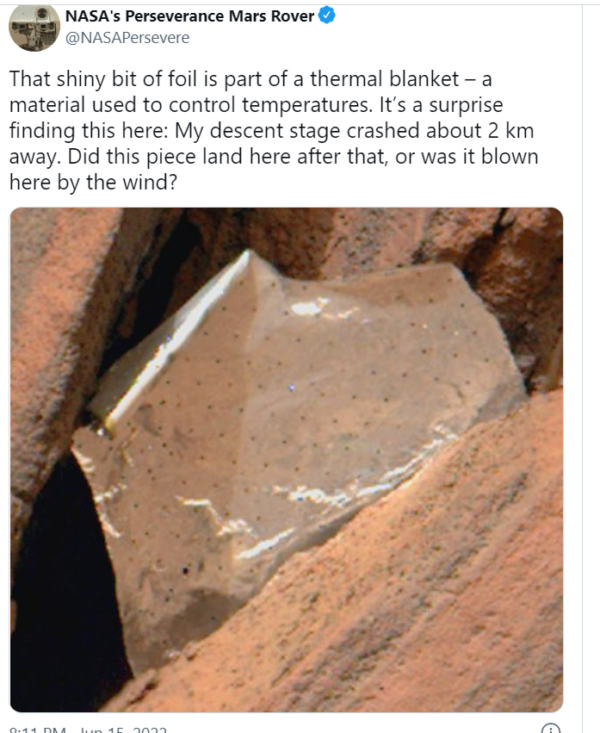

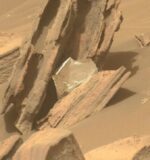





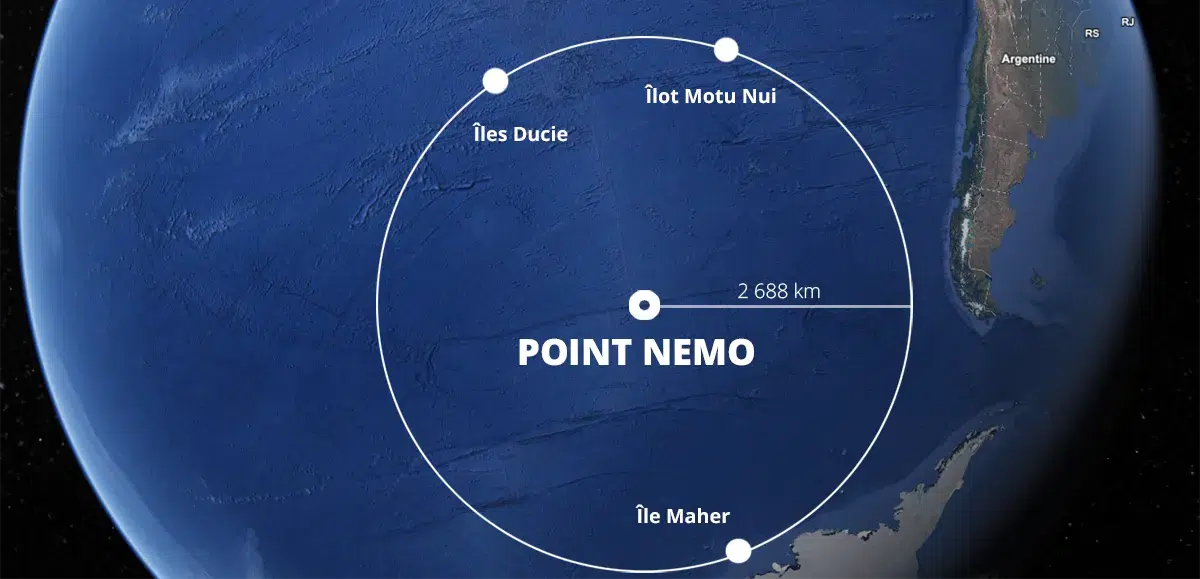
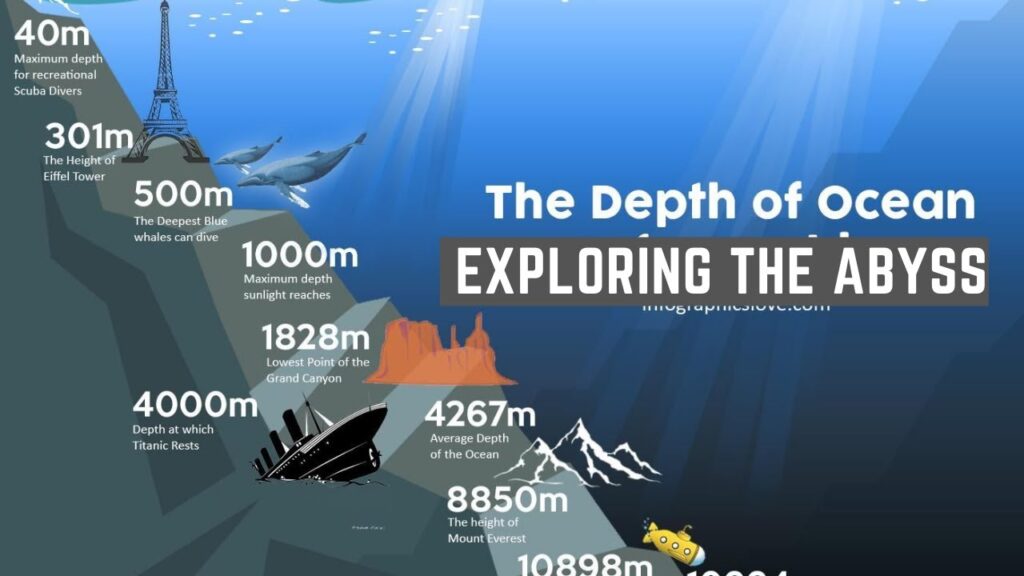
 Photographer Finds Locations Of 1960s Postcards To See How They Look Today, And The Difference Is Unbelievable
Photographer Finds Locations Of 1960s Postcards To See How They Look Today, And The Difference Is Unbelievable  Hij zet 3 IKEA kastjes tegen elkaar aan en maakt dit voor zijn vrouw…Wat een gaaf resultaat!!
Hij zet 3 IKEA kastjes tegen elkaar aan en maakt dit voor zijn vrouw…Wat een gaaf resultaat!!  Scientists Discover 512-Year-Old Shark, Which Would Be The Oldest Living Vertebrate On The Planet
Scientists Discover 512-Year-Old Shark, Which Would Be The Oldest Living Vertebrate On The Planet  Hus til salg er kun 22 kvadratmeter – men vent til du ser det indvendigt
Hus til salg er kun 22 kvadratmeter – men vent til du ser det indvendigt  Superknepet – så blir snuskiga ugnsformen som ny igen!
Superknepet – så blir snuskiga ugnsformen som ny igen!  Meteorite That Recently Fell in Somalia Turns Out to Contain Two Minerals Never Before Seen on Earth
Meteorite That Recently Fell in Somalia Turns Out to Contain Two Minerals Never Before Seen on Earth  Nearly Frozen Waves Captured On Camera By Nantucket Photographer
Nearly Frozen Waves Captured On Camera By Nantucket Photographer  It’s Official: Astronomers Have Discovered another Earth
It’s Official: Astronomers Have Discovered another Earth 